Erfahrungen internationaler Wissenschaftler*innen an der Uni Vechta
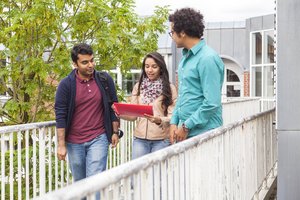
Zu welchen Themen forschen internationale Doktorand*innen an der Universität Vechta? Was hat den internationalen Gastwissenschaftler*innen während ihres Aufenthaltes an der Universität Vechta besonders gut gefallen? Wieso haben sie sich für Vechta und Deutschland entschieden?
In den folgenden Interviews antworten internationale Doktorand*innen, Gastforschende und Gastdozent*innen der Universität Vechta auf diese und weitere Fragen. Anhand ihrer Erfahrung können Sie sich einen Eindruck über die Forschungstätigkeit in Vechta und in Deutschland und deren Vorteile und Herausforderungen für internationale Wissenschaftler*innen, verschaffen, sowie wichtige Hinweise bekommen.
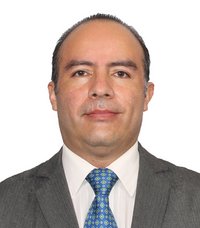
Mr. Julio Cesar Estrada Monterroso is pursuing a Ph.D. in Education Sciences at the University of Vechta. He is currently receiving a STIBET (DAAD) scholarship for socially engaged international Ph.D. students of the University of Vechta.
Title of Ph.D. project: “The University Campus as a Living Laboratory for Territorial Development. A Cross-case Analysis on Higher Education Institutions”
Supervisor at Uni Vechta: Prof. Dr. Marco Rieckmann
Mr. Monterroso, could you tell us a little bit about your experience before joining the University of Vechta, i.e. what did you study or if you had work experience prior to embarking on your PhD?
JCEM: I graduated as an architect in Guatemala in 2004. Then I completed a joint master’s degrees program on urban and regional development planning and management in Germany and Tanzania between 2006 and 2008. In the first year of the SPRING master´s programme (International Joint Master of Science - Regional Development Planning and Management), I studied at the technical university of Dortmund and in the second year in ARDHI university, Tanzania. After coming back to my home country, from 2009 to 2020, I pursued several short technical courses in Colombia, Chile, Peru, South Korea and Guatemala. I have also participated in German Alumni activities and seminars such as higher education for sustainable development in Ecuador (2009), sustainability through a transdisciplinary approach in Germany (2012), biodiversity management in the Andean – Amazonian region in Ecuador (2014) and the European week of regions and cities in Belgium (2018).
Concerning my work experience, I started my career as supervisor of water and sanitation infrastructure projects in rural areas of Guatemala. Then I worked as a technical assistant of an architecture and engineering studio. After coming back from my master studies, I have turned to consulting on urban and regional development planning with different international development agencies. This phase gave me the opportunity to be part of technical teams that formulated the long-term national development plan of Guatemala, as well as regional development plans and local land use plans. Then, for about five years, I have worked as a public servant in the National Planning Secretariat, being in charge of the national land use planning department, where I coordinated the Sustainable Development Goals implementation as well as methodologies and tool kits for monitoring and evaluation of local government interventions. All these activities were done through the search of consensus among stakeholders from the public and private sector, from civil society and higher education representatives. I have also taught in different universities of Guatemala at the bachelor and master´s degree level.
And how did you come to the idea of doing a PhD at the University of Vechta? What was it that attracted you here?
JCEM: I had the idea of doing a PhD ever since I began my first university degree. I had interest in research and innovation from the very beginning of my career. The topic of sustainable development got clear after completing the master´s degree. However, my interest in investigating the relation between sustainable development and higher education started in 2009 when I attended a DAAD alumni seminar in Ecuador on “Higher Education for Sustainable Development” where I met Prof. Dr. Marco Rieckmann, who is my current research supervisor at the University of Vechta. We kept in touch since that seminar and coincided through the years in different seminars in Germany and Ecuador. During this period, our communication allowed us to discuss about topics of interest related with higher education for sustainable development. Though I would have liked to start my PhD studies just after finishing my master´s degree, many personal unforeseen situations did not allow me to do it before. However, after searching in different PhD programmes and universities of Europe, Asia and America, the University of Vechta was the only one that allowed me to start my PhD studies with administrative support and with the willingness to receive my research proposal under the supervision of Prof. Dr. Marco Rieckman, who is currently professor of higher education development in the faculty of education and social sciences of the university. Though I am currently living in Guatemala and it has been a personal challenge to pursue a PhD research project, I have found administrative support and assertive academic orientations for my research in the University of Vechta. During the current pandemic limitations, the support has just increased and motivated me to continue with my studies even though the limitations and bottlenecks that we are all now facing.
Can you tell us about your research in a few sentences? What motivated you to choose this topic?
JCEM: My research project is entitled “The University Campus as a Living Laboratory for Territorial Development. A Cross-case Analysis on Higher Education Institutions” and its main objective is to create a holistic “Sustainable University” model that enables an “ideal” university campus and built environment as a living laboratory for territorial development. This investigation proposal aims to respond to the following question: “What are the main and common variables that typify a holistic management model of an ‘ideal’ sustainable university campus as a living laboratory for territorial development?”
Hordijk in Sonetti et al. (2015), with reference to Velasquez (2006), defines a sustainable university as follows: "(…) a sustainable university is a higher education institution, as a whole or as a part, that addresses, involves and promotes, on a regional or a global level, the minimization of negative environmental, economic, societal, and health effects generated in the use of their resources in order to fulfil its functions of teaching, research, outreach and partnership, and stewardship in ways to help society make the transition to sustainable life-styles”. Therefore, through the systems modelling theory, I am looking forward to defining a university campus as a living laboratory that will contribute to university decision makers, educational staff, and students to connect sustainable development goals with higher education.
What do you particularly like about the research environment in Vechta and in Germany?
JCEM: The most interesting part of doing research in the University of Vechta and in Germany is that there is respect and motivation for the researcher´s methodologies, analysis and findings. It allows us to investigate on a creative and purposeful matter. It also provides the state-of-the-art methodologies, sources, and technologies that drive a high-quality research environment. Though there is a self-path-oriented research, the supervisor´s orientations are always at the right moment, with complete availability for technical discussions and orientations.
What would you suggest to international students who would like to apply for a PhD in Germany: what would be the first steps? How to best prepare for it?
JCEM: My main recommendation is to have a clear idea of your research interest and then revise the PhD database options available in Germany. There are two main types of PhD programmes; the first one is as part of a job contract and the other one is with a scholarship. You should decide which type of programme you would like to pursue and then select the location and the institution that coincides with your specialization and research interests. There is plenty of financial support for international PhD students in Germany that will be an important fact to take into consideration. Higher education institutions in Germany are open and welcoming to international students, providing resources and information for any part of the world where you could start the overall PhD process.
It is not easy to pursue a research project with the scope of a PhD studies. There will be difficulties and challenges that could make it a hard path, however, if research and innovation are among your personal goals, Germany higher education institutions will be always open to receive and guide your research projects with kindness and high academic standards.
6. Oktober 2020
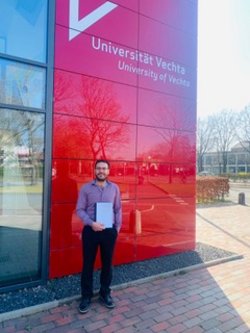
Mr. Yousry Hammed pursued a Ph.D. in Cultural Studies at the University of Vechta. He received a STIBET (DAAD) scholarship for socially engaged international Ph.D. students of the University of Vechta.
Title of Ph.D. project: “Der Nahe Osten und Europa im Spannungsfeld von Migration und Terrorismus“ (“The Middle East and Europe between the poles of migration and terrorism”)
Supervisor at Uni Vechta: Prof. Dr. Peter Nitschke
Herr Hammed, können Sie uns ein wenig über Ihre Erfahrungen vor Ihrer Zeit an der Universität Vechta erzählen, beispielsweise was Sie studiert haben oder ob Sie vor Ihrer Promotion bereits Berufserfahrung gesammelt haben?
YH: Ich habe mein Abitur 2009 mit der Note 1,2 in Ägypten abgeschlossen. Da ich die Azahritische Theologische Schule (eine islamische Schule) besucht habe, habe ich eine Zulassung an der islamischen Al-Azhar Universität in Kairo bekommen, an der ich Germanistik als Hauptfach und Islamwissenschaft als Zweitfach studieren durfte. In meinem dritten Studienjahr bin ich mit einem einmonatigen Stipendium vom DAAD ausgezeichnet worden, um an einer kulturwissenschaftlichen Sommerschule an der Universität Vechta teilzunehmen. Obwohl dies nur für einen Monat war, hat dieser kurze Aufenthalt mein Leben total verändert. Denn noch bevor mein Visum abgelaufen war und meine Rückkehr nach Ägypten notwendig wurde, um mein Abschlussjahr zu beenden, habe ich mich dafür entschieden, wieder nach Vechta zurückzukommen. Nachdem ich den 15-monatigen Militärdienst (verpflichtend) leisten musste, durfte ich im Jahr 2015 nach Vechta zurückkommen, wo ich das Studium (Master Kulturwissenschaft) aufgenommen habe. Seither dauert meine Reise in die Wissenschaft in Deutschland an. Ich muss zugeben, dass es zwar die beste Entscheidung meines Lebens war, ich jedoch mit vielen Herausforderungen konfrontiert wurde, was die neuen Studienfächer und das neue Leben im Lande der Wissenschaft betrifft. Das Jahr 2015 war kein normales, sondern ein besonderes Jahr, in dem die Flüchtlingskrise erfolgte und Deutschland die meisten Geflüchteten aufnahm, egal welche Konfessionen sie hatten oder aus welchem Land sie kamen. Dies spiegelte sich auch in meinem Leben wider. Ich habe Begriffe gehört, von denen ich keine Ahnung hatte, wie z.B. Integration. Ehrlich gesagt, ich habe mir über meine eigene Integration in die deutsche Gesellschaft gar keine Gedanken gemacht. Denn ich war sowohl neugierig, die deutsche bzw. westliche Kultur kennenzulernen, als auch bereit, mich in die deutsche Gesellschaft zu integrieren. Parallel dazu sollte ich mich auf mein Studium konzentrieren, das nicht einfach war. Denn das Bildungssystem in Ägypten ist anders als das in Deutschland. Trotzdem habe ich mein Masterstudium abgeschlossen und vor kurzem meine Dissertation abgegeben.
Wie sind Sie auf die Idee gekommen an der Universität Vechta zu promovieren? Was hat Sie dazu motiviert?
YH: Es ging mit dieser Idee los, nachdem ich meine Masterarbeit fertig geschrieben habe. In der Arbeit habe ich mich mit dem politischen Islam am Beispiel der Muslimbruderschaft beschäftigt. Die Arbeit wurde von Herrn Prof. Dr. Peter Nitschke als Erstgutachter und von Frau Prof. Dr. Rita Stein-Redent als Zweigutachterin betreut, mit 1,0 bewertet, und zählte zu den besten Abschlussarbeiten des Studienjahres 2017 an der Universität Vechta. Im Büro von Herrn Nitschke, in dem mein Masterkolloquium stattfand, hat er mich gefragt: „Herr Hammed, was wollen Sie hiernach machen?“ Ich antwortete: „Bei Ihnen promovieren.“ Ich erinnere mich noch an seine motivierende Antwort, nämlich: „Das ist die beste Entscheidung, dann weiter so!“ Somit begann meine Promotion im Fach Politikwissenschaft an der Universität Vechta.
Können Sie uns kurz etwas über Ihre Forschung erzählen? Was hat Sie motiviert, dieses Thema zu wählen?
YH: Da ich aus dem islamischen Kulturraum komme und jetzt in einem westlichen Land lebe, wollte ich über ein aktuelles Thema schreiben, das die beiden Kulturen im globalisierten Zeitalter miteinander verbindet. Von daher lautet der Titel meiner Arbeit: „Der Nahe Osten und Europa im Spannungsfeld von Migration und Terrorismus“. In dieser Arbeit bin ich der Frage nachgegangen, ob die Flüchtlingskrise und der islamistische Terrorismus als Ergebnisse des Kampfs der Kulturen anzusehen sind. Insofern habe ich die Fluchtursache, Fluchtrouten im Jahr 2015 und die Folgen der Flüchtlingskrise in der EU untersucht. Im zweiten Teil habe ich mich mit der Frage beschäftigt, was einen muslimischen Migranten oder einen Flüchtling dazu bewegt, einen Terroranschlag in Europa zu verüben, nachdem er tausende Kilometer zurücklegen musste, um der Gewalt in seinem Heimatland zu entgehen und vermeintlich auf der Suche nach Sicherheit in Europa zu sein. Deshalb habe ich die islamistische Ideologie "den Islamismus" und wie sie nach Europa gekommen ist, die Entstehung des islamistischen Terrorismus wie Al-Qaida und den Islamischen Staat und die neuen Herausforderungen, die in der Zukunft mit Europas Sicherheit zu tun haben, untersucht. Bevor ich mich für dieses Thema entschieden habe, wusste ich schon, dass dieses sehr sensibel ist. Ich hatte aber die Motivation, dass ich dem islamischen Kulturraum entstamme und mich mit diesem gut auskenne. Außerdem bin ich sowohl Muslim als auch Migrant, der Interesse daran hat, ein anderes Bild von Migranten und Muslimen zu zeichnen. Nicht alle Migranten und Muslime sind desintegrationsfähig in den westlichen Gesellschaften oder verüben terroristische Anschläge, sondern es gibt muslimische liberale Migranten, die den Mut haben, über solche Themen zu schreiben, um einen freien Raum für den liberalen Islam sowohl im Westen als auch in der islamischen Welt zu schaffen. Nur der liberale Islam ist integrations- und zukunftsfähig. Seine Basis muss meiner Meinung nach zuerst von liberalen Muslimen in Europa geschaffen werden, um den politischen Islam in Europa in Schach zu halten, und danach auf die islamische Welt übertragen werden. So würde ich gerne diesen Weg gehen.
Den Mut, um so über ein sowohl interessantes als auch sensibles Thema zu schreiben, hätte ich nicht ohne die Unterstützung meines Doktorvaters Prof. Dr. Peter Nitschke gehabt, der ständig an meiner Seite steht. Ohne seine wissenschaftliche und methodische Unterstützung während der gesamten Bearbeitungsphase meiner Dissertation hätte ich die Doktorarbeit nicht schreiben können.
Was gefällt Ihnen am Forschungsumfeld in Vechta und in Deutschland besonders gut?
YH: Was das Forschungsumfeld in Deutschland betrifft, gefällt mir die Forschungsfreiheit am besten, die für die meisten als selbstverständlich zu sein scheint, aber sie ist es nicht. Es gibt viele Länder, die diese Freiheit in der Forschung oder bei der Auswahl der Forschungsthemen nicht haben. Ich hoffe, dass diese immer aufrechterhalten wird und Verfechter und Verteidiger findet. Das Scheitern der Forschungsfreiheit wird nicht an der Stärke ihrer Feinde liegen, sondern der Schwäche ihrer Verfechter. Denn wir wollen diese an die nächste Generation weitergeben, so wie die Vorherige sie an uns weitergegeben hat.
Was würden Sie anderen internationalen Studierenden empfehlen, die sich für eine Promotion in Deutschland bewerben möchten? Was wären die ersten Schritte? Wie können sie sich am besten darauf vorbereiten?
YH: Der erste Schritt ist, dass man schon wissen muss, was man damit erreichen möchte. Der zweite Schritt ist der Betreuer, ohne den man keine Doktorarbeit schreiben kann/darf. Mit der Zulassung des Betreuers spielt das Thema auch eine wichtige Rolle. Bevor man sich aber mit dem Betreuer in Verbindung setzt, muss man mehrere Themen im Kopf haben, um sich ein Thema mit Vereinbarung des Betreuers auswählen zu können. Mit der Zulassung des Betreuers muss der Kontakt mit der Universität aufgenommen werden, an der man promovieren möchte. So fängt die Reise auf dem Weg zum Doktortitel an.
Hier in Vechta haben Sie sich auch außerhalb der Universität in verschiedenen sozialen Bereichen engagiert und Sie erhalten gerade ein Stipendium für sozial engagierte internationale Doktorand*innen der Universität Vechta. Können Sie uns etwas über Ihr soziales Engagement erzählen?
YH: Seit 2017 engagiere ich mich sozial im Bereich Migration und Integration syrischer geflüchteter Familien unter Betreuung von der Caritas und der Stadt Vechta. Soweit möglich, versuche ich den Geflüchteten das hiesige System und die westlichen Werte näherzubringen. Besonders hervorzuheben ist meine Betreuung einer syrischen Familie, die der Stadt Vechta über die Vereinten Nationen zugewiesen worden ist. Für diese Familie bin ich seit Dezember 2019 der Ansprechpartner bei diversen Krankenhäusern und Ärzten, weil eines der Kinder sehr krank ist. Neben diesen Familien betreue ich aber auch andere geflüchtete Familien, die noch nicht die Sprache beherrschen können. Insofern kam mir eine neue Aufgabe mit dem Ausbruch der Pandemie zu, und zwar: Orientierung zu geben, was die Hygiene- und Bekämpfungsmaßnahmen angeht, die sowohl vom Robert-Koch-Institut und als auch von der Regierung ergriffen worden sind, um die Pandemie einzudämmen. Was hier hervorzuheben ist, ist der Umgang mit dem Virus, falls jemand infiziert wäre. Es ist uns bis hierhin gelungen, dass sich kein Mitglied der von mir betreuten Familien mit Covid-19 infiziert hat.
10. April 2021
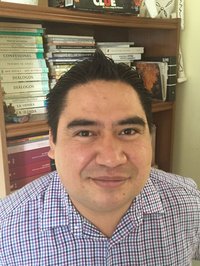
Mr. David Valerio Miranda has a master and a doctorate in Philosophy. He participated in the Global Talents for local Transformations Program (October 2021 - April 2022), funded by the Research in Germany initiative of the German Ministry of Education and Research (BMBF)
1. Could you tell us a little bit about your experience before joining the University of Vechta, i.e., what and where were you studying/researching prior to your research stay in Vechta?
I studied my bachelor's and master's degrees in philosophy at the Universidad Autónoma de Zacatecas, Mexico. Later, I studied a PhD in Philosophy at the Universidad Michoacana de San Nicolás de Hidalgo, México. In my academic career I have specialized in subjects such as Political and Cultural Philosophy, Ethics and Philosophy in Mexico.
2. And how did you come to the idea of spending some time at the University of Vechta? What was it that attracted you here?
Since I was a child I have been interested in German culture, an interest that grew stronger throughout my life. Hence, I have always wanted to get to know the country and its culture. When I was doing my PhD in 2019, I received an invitation to participate in the summer school "Current crisis of democracy in Brazil and Mexico". The summer school was held at the University of Vechta. When I received the invitation, I was very happy and did not hesitate to take the opportunity to go to Germany. Moreover, I knew that German universities have a worldwide prestige for being of the highest quality. That's how I got to know Germany and the University of Vechta for the first time and fell in love with both the country and the University.
3. Can you tell us about your research in a few sentences? What motivated you to choose this topic?
From November 2021 to April 2022, I carried out a research stay at the University of Vechta within the program "Global talents for local transformations". I conducted a research on community ethics as a possibility to develop direct council democracy, plurality and ecological awareness in rural communities in Mexico. I chose this topic because my research in Philosophy is related to both Political Philosophy and Ethics. Besides, I consider that community Ethics that occur in rural communities constitute a culture, thought and way of life that could help other contexts, also not necessarily rural, so I thought it would be interesting to contrast this proposal with the global context and its different problems.
4. What do you particularly like about the research environment in Vechta and in Germany?
What I liked most about doing research at the University of Vechta and in Germany is that the University is of the highest quality, I received great support from the international office to successfully complete my research stay, and the professors, seminars and workshops I could profit from, as well as the infrastructure, are also of the highest quality. Another reason why I liked researching in Germany is that I really like German culture. Moreover, it is a safe country, people are friendly, cultured and very polite, and the city of Vechta in Lower Saxony is perfect for studying or doing research, since it is a fairly quiet, peaceful, clean city, with a great infrastructure and everything you need to research or study properly.
5. What piece of advice would you give to other international researchers who would like to come to Germany for a research stay?
I would advise and recommend researchers who want to come to Germany to make the decision to come: it is a great country with excellent universities and living and researching in Germany is truly a great experience. Above all, you will learn a lot and strengthen your research skills through the education offered here. I was very happy to do research in Germany and I will always be very grateful to it.
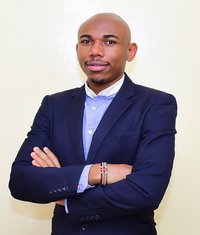
Klaus Tezokeng is a Ph.D. student at the University of Pretoria, South Africa, and was a visiting scholar at the Univesrity of Vechta's Faculty III, Department of Cultural Studies, from October 2021 to March 2022.
Could you tell us a little bit about your experience before joining the University of Vechta, i.e., what and where were you studying/researching prior to your research stay in Vechta?
I completed my bachelor’s and master’s degrees in German Studies at the University of Yaoundé I (July 2017) and the University of Nairobi (December 2020) respectively, specialising in literary and cultural studies. In January 2021, I was not only admitted to the University of Pretoria to pursue my PhD studies but was also granted the University of Pretoria Commonwealth Doctoral Scholarship to carry out my research. Before joining the University of Vechta, I had started conducting my research in the field of literary and environmental studies and was further developing my PhD research proposal in Pretoria with my home supervisor, Prof. Dr. Stephan Mühr.
And how did you come to the idea of spending some time at the University of Vechta? What was it that attracted you here?
In the early stages of my PhD proposal development, which go back to November 2019, I constantly came across highly interesting publications written by Prof. Dr. Gabriele Dürbeck whom I then liaised with. I was lucky enough to get both positive feedback and a declaration of intention to supervise me during a research stay at the University of Vechta. I was later awarded a short-term research grant by the German Academic Exchange Service (DAAD) to carry out research in Vechta under the mentorship of Prof. Dr. Dürbeck for the period October 2021 - March 2022.
Can you tell us about your research in a few sentences? What motivated you to choose this topic?
In my PhD project, I explore Human-nature-relationships and their attendant discursive aspects in selected fictions of the contemporary literature in German. The project is aimed at looking at the selected texts as transit spaces of many discourses on the environment, which partly converge but can at the same time be discordant. I look specifically at how the so-called anthropogenic environmental catastrophes are addressed in the fictions but also at the power constellations that arise from the Human-nature-dualism. Moreover, I pay attention to how literature anticipates solutions to the environmental degradation by suggesting eco-friendly, ethical, ecosophy-based, and monistic nature-culture-encounters. Lastly, I analyse environmental degradation and conservation from a generational perspective whereby degradation is mostly associated to past and current generations and conservation portrayed as the responsibility of the current generation for the sake of future generations. The project aims at investigating discursive and interdiscursive dynamics in a selected corpus of 11 novels.
What do you particularly like about the research environment in Vechta and in Germany?
I would say my experience at the University of Vechta really exceeded my expectations not only because my supervisor, Prof. Dr. Dürbeck, was fully at my disposal despite her various occupations, but also because of the constant support I received from the International Office and especially from its Welcome Centre. It happened that I visited the University of Vechta during exceptional times due to the COVID-19 pandemic, but the research atmosphere was so friendly that I never felt the pinch of the pandemic on my research activities. I found the research facilities at the University of Vechta, especially in the University Library very exciting and was very lucky to access recent publications in my research field.
Regarding the research environment in Vechta and in Germany at large, I would say I was lucky to have a convenient workspace and a well-equipped library at the University of Pretoria, although studying towards a PhD degree in German Studies in an English-speaking environment can sometimes be challenging especially regarding publications in German. The research stay at the University of Vechta therefore helped fill this little gap. I also believe that international scientific cooperation is an important asset for a researcher’s life. In this view, my exchange programmes in Vechta, but also Paderborn in 2019 (Prof. Dr. Michael Hofmann), and in Germany in general have not only contributed to my academic journey but have also led to more international collaborations, which I am extremely happy of.
Furthermore, the Graduate Centre of the University of Vechta offers advanced trainings aimed at equipping researchers and staff members with important transdisciplinary skills. I was able to gather more theoretical, methodological, and practical insights in fields such as education for sustainable development, scientific writing, third-party fundings, research data management thanks to Prof. Dr. Marco Rieckmann, Dr. Anselm Spindler, Dr. Sebastian Keßler and Dr. Thomas Enkel. These opportunities gave my research stay at the University of Vechta a special touch and I would like to appreciate the efforts of Ms. Indra Smith of the Graduate Centre.
I would also like to extend my sincere gratitude to Prof. Dr. Gabriele Dürbeck and Dr. Christoph Schaub whose feedback and suggestions have significantly contributed to the quality of my research project. My deepest appreciation also goes to Dr. Caterina Bonora who went extra miles to make my research stay at the University of Vechta an incredible experience. I also thank DAAD for awarding me a research grant and in extenso fostering my academic pathway.
What piece of advice would you give to other international researchers who would like to come to Germany for a research stay?
I would strongly encourage international researchers looking forward to carrying out research in Germany to do so, and if possible, visit the wonderful University of Vechta. Germany is a great country with an interesting and extremely exciting research environment.
PS: By the way, the City of Vechta offers a very kind voucher to anyone who registers in Vechta for the first time. I think this was the best gift ever as I had not expected such a welcome from the City of Vechta.
